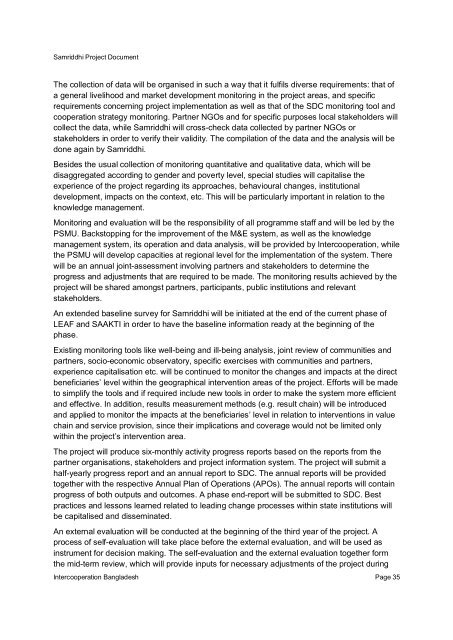Samriddhi
Samriddhi
Samriddhi
Create successful ePaper yourself
Turn your PDF publications into a flip-book with our unique Google optimized e-Paper software.
<strong>Samriddhi</strong> Project Document<br />
The collection of data will be organised in such a way that it fulfils diverse requirements: that of<br />
a general livelihood and market development monitoring in the project areas, and specific<br />
requirements concerning project implementation as well as that of the SDC monitoring tool and<br />
cooperation strategy monitoring. Partner NGOs and for specific purposes local stakeholders will<br />
collect the data, while <strong>Samriddhi</strong> will cross-check data collected by partner NGOs or<br />
stakeholders in order to verify their validity. The compilation of the data and the analysis will be<br />
done again by <strong>Samriddhi</strong>.<br />
Besides the usual collection of monitoring quantitative and qualitative data, which will be<br />
disaggregated according to gender and poverty level, special studies will capitalise the<br />
experience of the project regarding its approaches, behavioural changes, institutional<br />
development, impacts on the context, etc. This will be particularly important in relation to the<br />
knowledge management.<br />
Monitoring and evaluation will be the responsibility of all programme staff and will be led by the<br />
PSMU. Backstopping for the improvement of the M&E system, as well as the knowledge<br />
management system, its operation and data analysis, will be provided by Intercooperation, while<br />
the PSMU will develop capacities at regional level for the implementation of the system. There<br />
will be an annual joint-assessment involving partners and stakeholders to determine the<br />
progress and adjustments that are required to be made. The monitoring results achieved by the<br />
project will be shared amongst partners, participants, public institutions and relevant<br />
stakeholders.<br />
An extended baseline survey for <strong>Samriddhi</strong> will be initiated at the end of the current phase of<br />
LEAF and SAAKTI in order to have the baseline information ready at the beginning of the<br />
phase.<br />
Existing monitoring tools like well-being and ill-being analysis, joint review of communities and<br />
partners, socio-economic observatory, specific exercises with communities and partners,<br />
experience capitalisation etc. will be continued to monitor the changes and impacts at the direct<br />
beneficiaries’ level within the geographical intervention areas of the project. Efforts will be made<br />
to simplify the tools and if required include new tools in order to make the system more efficient<br />
and effective. In addition, results measurement methods (e.g. result chain) will be introduced<br />
and applied to monitor the impacts at the beneficiaries’ level in relation to interventions in value<br />
chain and service provision, since their implications and coverage would not be limited only<br />
within the project’s intervention area.<br />
The project will produce six-monthly activity progress reports based on the reports from the<br />
partner organisations, stakeholders and project information system. The project will submit a<br />
half-yearly progress report and an annual report to SDC. The annual reports will be provided<br />
together with the respective Annual Plan of Operations (APOs). The annual reports will contain<br />
progress of both outputs and outcomes. A phase end-report will be submitted to SDC. Best<br />
practices and lessons learned related to leading change processes within state institutions will<br />
be capitalised and disseminated.<br />
An external evaluation will be conducted at the beginning of the third year of the project. A<br />
process of self-evaluation will take place before the external evaluation, and will be used as<br />
instrument for decision making. The self-evaluation and the external evaluation together form<br />
the mid-term review, which will provide inputs for necessary adjustments of the project during<br />
Intercooperation Bangladesh Page 35
















